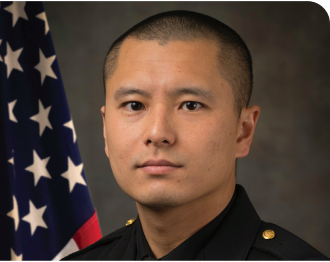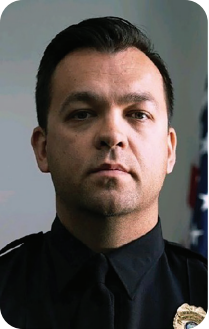Continuing To Serve: Veterans In Law Enforcement
SERVING OTHERS DOESN’T HAVE TO END WHEN YOU LEAVE THE MILITARY.
Making a difference in the lives of others is often the ultimate goal in any career field. For some, that begins with military service. Wen Chen, a deputy sheriff of Contra Costa County in California and current American Corporate Partners (ACP) mentor, is also a U.S. Navy veteran.
“Many of us who have been deployed overseas know that no matter the situation or circumstances, we keep pushing forward until we accomplish our mission,” Chen explained. “Throughout our service, we have developed these valuable characteristics that would further make us stronger later in life and better able to serve our communities.”
Chen described “resiliency, perseverance, and sacrifice” as the major strengths that veterans bring to law enforcement careers.
Samir Dzaferagic, U.S. Air National Guard veteran and current ACP protégé, explained how his military service inspired his career
in law enforcement.

“Being a police officer was a dream come true to me, and I also saw it as a calling, more than just any job. I had a desire to serve my community, and I wanted to be challenged, physically and mentally. I felt that I could make a positive difference in people’s lives as a police officer,” he said.
Your transition can be the start of a new chapter. Through mentorship at ACP, transitioning veterans and military spouses can explore meaningful career paths in rewarding fields that align with their skills and goals—including law enforcement.
Taking the First Step
Chen laid out some concrete steps for veterans considering a career in policing.
“My advice to a veteran who’s looking into becoming a peace officer would be to find a mentor with American Corporate Partners,” he said. “Also, for those interested in public safety, contact your local law enforcement agency, such as your local sheriff’s office or police department.”
Dzaferagic, now a fugitive task force officer with 20 years in policing, offered this guidance.
“My advice to someone starting a law enforcement career would be to pursue your dreams. If you have a desire to serve and be a guardian of your community, then this is the career path for you. I would ask myself this question: If not me, then who? Someone has to step up.”
Regardless of your specific career path within law enforcement, don’t neglect the basics of any professional pursuit.
“No matter your background and experience, come into the industry willing to learn,” said another ACP mentor with more than 20 years of experience in law enforcement and executive security. “Check your ego at the door. The most successful law enforcement individuals are adaptable, respectful and they learn from every team member and assignment.
“Develop soft skills as much as tactical ones. [The security field] isn’t just about protection; it’s also about client service. Learn to blend in, communicate professionally and anticipate needs. Build a solid reputation through trustworthiness, discretion and
consistent performance.”

Having an ACP mentor means having someone in your corner— someone to support you, regardless of your chosen path. A mentor can offer firsthand knowledge about what a career in law enforcement looks like. They can also guide you through the hiring process by offering tips such as résumé building, job searching, networking and conducting mock interviews.
You may only know that you want to help people and are unsure what that will ultimately look like for you. Your mentor can help you map out possible career paths to narrow down which one is best for you: patrol, investigations, federal agencies or specialized units like K-9 or SWAT.
“I have an amazing mentor who is very busy as a police chief of a large police agency, yet he is very accommodating and seems
to always find time to mentor me,” Dzaferagic said. “My mentor’s advice and interview preparation sessions have helped me build confidence during job interviews. He has helped me see certain things from a different angle, which I might not have considered previously.”
Mentors benefit from the experience as well. For Chen, the opportunity to guide another veteran has been deeply rewarding.
“This experience [with ACP] has been great because I was allowed to look at law enforcement from a different perspective, not
only as a deputy sheriff but as part of the community as well,” he explains. “In addition, I am also grateful to have the chance to demonstrate and improve my leadership skills. One way of becoming a better leader is to effectively communicate with others, and this mentorship experience has afforded me a valuable opportunity.”
Unlock Your Potential with ACP Mentorship
ACP is a national nonprofit organization focused on helping returning veterans and active-duty spouses find their next careers through one-on-one mentoring, networking and online career advice. By signing up at acp-usa.org, you can take that jump
into the law enforcement field with support following you every step of the way!


